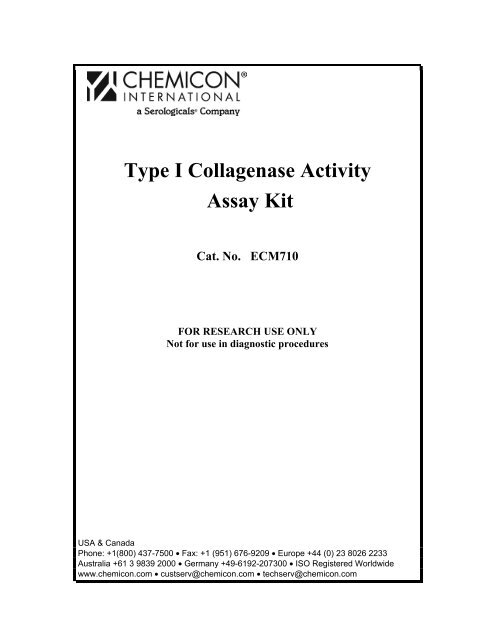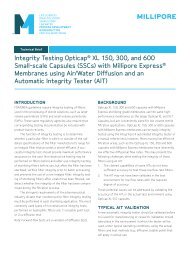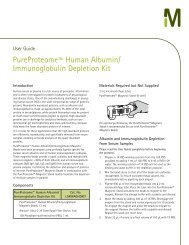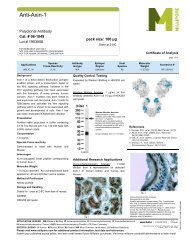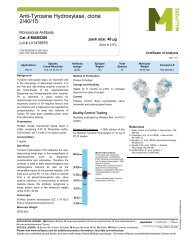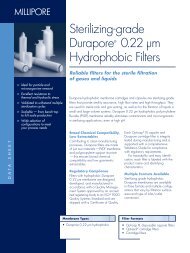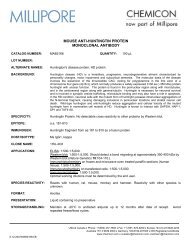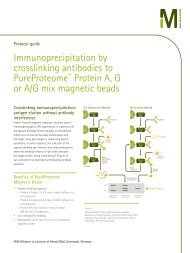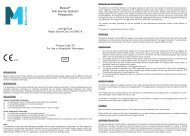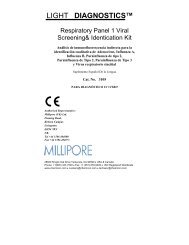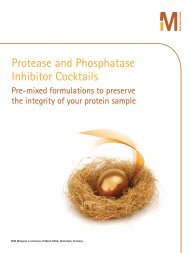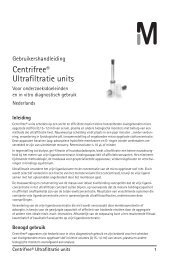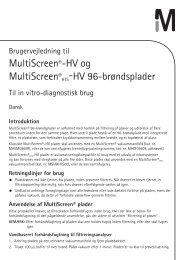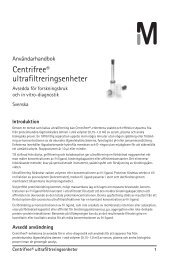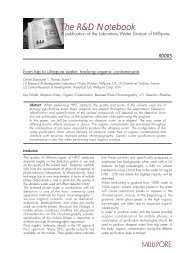Type I Collagenase Activity Assay Kit - Millipore
Type I Collagenase Activity Assay Kit - Millipore
Type I Collagenase Activity Assay Kit - Millipore
Create successful ePaper yourself
Turn your PDF publications into a flip-book with our unique Google optimized e-Paper software.
<strong>Type</strong> I <strong>Collagenase</strong> <strong>Activity</strong><br />
<strong>Assay</strong> <strong>Kit</strong><br />
Cat. No. ECM710<br />
FOR RESEARCH USE ONLY<br />
Not for use in diagnostic procedures<br />
USA & Canada<br />
Phone: +1(800) 437-7500 • Fax: +1 (951) 676-9209 • Europe +44 (0) 23 8026 2233<br />
Australia +61 3 9839 2000 • Germany +49-6192-207300 • ISO Registered Worldwide<br />
www.chemicon.com • custserv@chemicon.com • techserv@chemicon.com
Introduction<br />
<strong>Collagenase</strong>s (MMP-1, MMP-8, and MMP-13) are members of a family of<br />
matrix metalloproteinases (MMPs) which are able to degrade components of the<br />
extracellular matrix.<br />
The CHEMICON ® MMP <strong>Collagenase</strong> <strong>Activity</strong> <strong>Assay</strong> <strong>Kit</strong> provides a quick,<br />
efficient and sensitive system for evaluation of collagenase activity in serum,<br />
cell lysates, supernatants, and other samples, or collagenase inhibitor screening.<br />
The 96-well format of the kit is significantly faster than traditional zymography<br />
for evaluation of multiple samples, offers the versatility of 8 x 12 strip well<br />
design, can be easily measured with a microplate reader, and contains purified<br />
Human MMP-1 as a positive control. <strong>Assay</strong> time is approximately 4 hours.<br />
Test Principle<br />
The CHEMICON ® MMP <strong>Collagenase</strong> <strong>Activity</strong> <strong>Assay</strong> <strong>Kit</strong> utilizes Bovine<br />
biotinylated collagen as a substrate. This native, triple helical substrate is<br />
readily cleaved by active MMP-1, MMP-8 and MMP-13 (collagenotic)<br />
enzymes. Following addition of the enhancer, the remaining biotinylated<br />
fragments are then transferred to a biotin-binding 96-well plate and detected<br />
1
with streptavidin-enzyme complex. Addition of enzyme substrate results in a<br />
colored product, detectable by its Optical Density at 450 nm (OD450).<br />
Application<br />
The CHEMICON ® MMP <strong>Collagenase</strong> <strong>Activity</strong> <strong>Assay</strong> <strong>Kit</strong> is ideal for<br />
measurement of collagenase activity or collagenase inhibitor potency in culture<br />
supernatants, serum, cell lysates or other collagenase-containing samples.<br />
According to literature values, collagenase levels for conditioned media of<br />
cultured cells and serum are typically in the range of 10-200 ng/mL. The<br />
CHEMICON ® MMP <strong>Collagenase</strong> <strong>Activity</strong> <strong>Assay</strong> <strong>Kit</strong> is a quantitative assay.<br />
Experimental studies using purified, APMA-activated MMP-1 have established<br />
the analytical sensitivity of the kit to be less than 5 ng of MMP per mL, which is<br />
much more sensitive than traditional SDS-PAGE/densitometry.<br />
APMA (p-Aminophenylmercuric Acetate)-activated MMP-1 is supplied as a<br />
positive control for quantitative purposes. Recombinant MMP-8 and MMP-13<br />
standards for quantitative purposes are available separately as catalog numbers<br />
CC067 and CC1047, respectively. Customers have the option of measuring<br />
endogenous MMP activity levels in their samples or activating their samples<br />
with APMA prior to the assay.<br />
Each CHEMICON ® MMP <strong>Collagenase</strong> <strong>Activity</strong> <strong>Assay</strong> <strong>Kit</strong> contains sufficient<br />
reagents for the evaluation of 96 samples, including positive control. Duplicate<br />
or triplicate samples are suggested.<br />
The CHEMICON ® MMP <strong>Collagenase</strong> <strong>Activity</strong> <strong>Assay</strong> <strong>Kit</strong> is intended for<br />
research use only; not for diagnostic or therapeutic applications.<br />
2
<strong>Kit</strong> Components<br />
1. MMP-1 Positive Control: (Part No. 90054) One lyophilized vial containing<br />
500 ng of APMA-activated human MMP-1.<br />
2. Biotinylated <strong>Collagenase</strong> Substrate: (Part No. 90052) One 600 µL vial.<br />
3. Sample Diluent, 5X: (Part No. 90056) One 10 mL bottle.<br />
4. Biotin-binding Plate: (Part No. 90023) One 96-well biotin-binding plate.<br />
5. Enhancer: (Part No. 90055) One lyophilized vial.<br />
6. Streptavidin-Enzyme Conjugate: (Part No. 90053) One 21 µL vial.<br />
7. Substrate Solution: (Part No. 90028) One 12 mL vial.<br />
8. Stop Solution: (Part. No. 60193) One 12 mL vial.<br />
9. <strong>Assay</strong> Buffer, 10X: (Part. No. 90027) One 100 mL bottle.<br />
Materials Not Supplied<br />
1. APMA for MMP activation of samples (if desired)<br />
2. Multichannel pipette and tips<br />
3. Microplate reader (450 nm)<br />
4. 37°C incubator<br />
5. Clean 96-well microtiter plate for performing incubations.<br />
6. Deionized water<br />
Special Precautions<br />
1. Maintain all kit components at 2° to 8°C. The MMP-1 Positive Control and<br />
Biotinylated <strong>Collagenase</strong> Substrate are especially temperature sensitive, and<br />
mishandling may negatively effect the kit’s performance.<br />
2. Due to the fragile, native structure of the Biotinylated <strong>Collagenase</strong><br />
Substrate, perform all dilutions and handling of this material at 2° to 8°C.<br />
Do not freeze.<br />
3. Do not add the Biotinylated <strong>Collagenase</strong> Substrate directly to the 5X<br />
Sample Diluent. This will denature the substrate.<br />
3
4. <strong>Assay</strong> incubations must be performed at 37±1°C for optimal enzymatic<br />
activity, while maintaining the substrate’s native structure. Excessive heat<br />
will denature the substrate.<br />
Sample Preparation/Activation<br />
1. Prepare <strong>Collagenase</strong>-containing samples as desired. MMP-1 Positive<br />
Control has been pre-activated with APMA and does not require further<br />
activation. 10-100 µL of diluted samples will be required per well<br />
(triplicate sample wells are recommended). Note: Samples should not<br />
contain EDTA, EGTA or other chelators of divalent cations.<br />
2. If APMA activation of samples is desired, prepare a 20mM APMA<br />
solution.<br />
a) Dissolve 3.5 mg of APMA (not provided) in 0.5 mL of 0.1N NaOH.<br />
This stock solution is stable for approximately 3 days at 4°C.<br />
3. Activate samples by adding 350 µL of sample to 100 µL of 250 mM Tris,<br />
pH 7.5, 50 mM CaCl2, plus 50 µL of APMA solution from Step 2.<br />
4. Incubate sample for 5 hours at 37°C. Use activated collagenase within one<br />
day for best results.<br />
Generating a Standard Curve with the MMP-1 Positive Control<br />
1. Rehydrate the vial of MMP-1 Positive Control with 100 µL of deionized<br />
water and mix well. Use immediately or aliquot and freeze at -80°C for<br />
longer storage. Avoid repeated freeze/thaw cycles.<br />
Note: Once reconstituted, the MMP-1 Positive Control concentration will<br />
be 5 ng/µL.<br />
2. In a clean, 96-well microtiter plate, serially dilute the MMP-1 Positive<br />
Control 1:2 by the following method:<br />
• Add 20 µL of 1X Sample Diluent to wells B1-H1.<br />
• Add 40 µL of reconstituted MMP-1 Positive Control (step 1) to<br />
well A1.<br />
• Transfer 20 µL of MMP-1 Positive Control (starting from well A1)<br />
into the next well already containing 20 µL of 1X Sample Diluent,<br />
as illustrated below in Template #1 until the MMP-1 has been<br />
diluted 64-fold (2 6 ) in row G. Leave row H as a zero control.<br />
4
Template #1: Dilution of MMP-1 Positive Control<br />
A<br />
1 2 3 4 5 6 7 8 9 10 11 12<br />
neat<br />
(5 ng/µL)<br />
B 1:2<br />
C 1:4<br />
D 1:8<br />
E 1:16<br />
F 1:32<br />
G 1:64<br />
H 0<br />
• Maintaining the same pattern, on the clean part of the plate transfer<br />
10 µL of the diluted MMP-1 positive control (wells A1-H1). See<br />
template #2 for the respective amount of MMP-1 transferred per<br />
well.<br />
Template #2: Transfer of diluted MMP-1 Positive Control (10 µL)<br />
A<br />
B<br />
C<br />
D<br />
E<br />
F<br />
G<br />
H<br />
1 2 3 4 5 6 7 8 9 10 11 12<br />
5<br />
neat<br />
(50 ng)<br />
1:2<br />
(25 ng)<br />
1:4<br />
(12.5 ng)<br />
1:8<br />
(6.25 ng)<br />
1:16<br />
(3.13 ng)<br />
1:32<br />
(1.56 ng)<br />
1:64<br />
(0.78 ng)<br />
0<br />
(0 ng)<br />
3. Proceed with the assay from step 2 of “<strong>Assay</strong> Instructions” using 10 µL as<br />
the sample volume.
<strong>Assay</strong> Instructions<br />
1. First, determine whether 10 µL, 50 µL, or 100 µL Test Samples will be<br />
used. The CHEMICON ® MMP <strong>Collagenase</strong> <strong>Activity</strong> <strong>Assay</strong> <strong>Kit</strong> can<br />
accurately detect collagenase activity with analytical sensitivity to less than<br />
10 ng/mL. For samples with low expected collagenase content (less than<br />
20 ng/mL) a 100 µL sample size is suggested. For samples with higher<br />
activity, a 10 µL sample is recommended.<br />
2. In a small vial, pre-dilute the appropriate volume of Biotinylated<br />
<strong>Collagenase</strong> Substrate required for the number of wells to be assayed with<br />
cold, deionized water. Mix well and store at 2° to 8°C until needed.<br />
Depending on the sample volume, the final pre-diluted substrate volume<br />
will vary, select the appropriate chart below.<br />
For 10 µL Samples<br />
Number of wells to be<br />
<strong>Assay</strong>ed<br />
Volume of Biotinylated<br />
<strong>Collagenase</strong> Substrate<br />
6<br />
Volume of cold,<br />
deionized water<br />
96 500 µL 9.500 mL<br />
48 250 µL 4.750 mL<br />
24 125 µL 2.375 mL<br />
16 83.3 µL 1.583 mL<br />
8 41.6 µL 0.792 mL<br />
For 50 µL Samples<br />
Number of wells to be<br />
<strong>Assay</strong>ed<br />
Volume of Biotinylated<br />
<strong>Collagenase</strong> Substrate<br />
Volume of cold,<br />
deionized water<br />
96 500 µL 5.500 mL<br />
48 250 µL 2.750 mL<br />
24 125 µL 1.375 mL<br />
16 83.3 µL 0.916 mL<br />
8 41.6 µL 0.458 mL
For 100 µL Samples<br />
Number of wells to be<br />
<strong>Assay</strong>ed<br />
Volume of Biotinylated<br />
<strong>Collagenase</strong> Substrate<br />
96 500 µL 500 µL<br />
48 250 µL 250 µL<br />
24 125 µL 125 µL<br />
16 83.3 µL 83.3 µL<br />
8 41.6 µL 41.6 µL<br />
7<br />
Volume of cold,<br />
deionized water<br />
Note: Once diluted, Biotinylated <strong>Collagenase</strong> Substrate should be used<br />
immediately. This material should not be stored in the diluted form and should<br />
not be frozen.<br />
3. Rehydrate the vial of Enhancer with 1.1 mL of deionized water. Mix well<br />
and store at 2° to 8°C until needed.<br />
4. For 10 µL samples: In a clean, 96-well microtiter plate (triplicate is<br />
recommended), add 10µL of MMP test sample (prepared as described in<br />
“Sample Preparation”) to each well, followed by 30 µL of 5X Sample<br />
Diluent. With the diluent and sample added, then add 100 µL of diluted<br />
Biotinylated <strong>Collagenase</strong> substrate from Step 2. The total volume should<br />
be 140 µL.<br />
For 50 µL samples: In a clean, 96-well microtiter plate (triplicate is<br />
recommended), add 50µL of MMP test sample (prepared as described in<br />
“Sample Preparation”) to each well, followed by 30 µL of 5X Sample<br />
Diluent. With the diluent and sample added, then add 60 µL of diluted<br />
Biotinylated <strong>Collagenase</strong> substrate from Step 2. The total volume should<br />
be 140 µL.<br />
For 100 µL samples: In a clean, 96-well microtiter plate (triplicate is<br />
recommended), add 100µL of MMP test sample (prepared as described in<br />
“Sample Preparation”) to each well, followed by 30 µL of 5X Sample<br />
Diluent. With the diluent and sample added, then add 10 µL of diluted<br />
Biotinylated <strong>Collagenase</strong> substrate from Step 2. The total volume should<br />
be 140 µL.<br />
5. Cover the plate and incubate for 2 hours at 37°C.<br />
6. Add 10 µL of Enhancer (from step 3) to each well.<br />
7. Cover the plate and incubate for an additional 30 minutes at 37°C.
8. Rehydrate Biotin-binding Plate with ~200 µL of PBS per well and let the<br />
plate stand at room temperature for 1 minute. Do not use <strong>Assay</strong> Buffer for<br />
rehydration.<br />
9. Aspirate PBS from Biotin-binding Plate, being careful not to scratch the<br />
plate.<br />
10. Transfer 100 µL of the Sample/Biotinylated <strong>Collagenase</strong> Substrate mixture<br />
from Step 7 to the rehydrated Biotin-binding Plate and incubate for 30<br />
minutes at 37°C.<br />
11. Dilute sufficient 10X <strong>Assay</strong> Buffer with deionized water for the number of<br />
samples to be assayed. If using the entire 96-well plate, add the entire<br />
100 mL volume of 10X <strong>Assay</strong> Buffer to 900 mL deionized water. If using<br />
fewer wells, scale down amount of <strong>Assay</strong> Buffer and deionized water<br />
accordingly.<br />
12. Wash 5 x with 200 µL/well of diluted <strong>Assay</strong> Buffer.<br />
13. Prepare a 1:3000 dilution of Streptavidin-Enzyme Conjugate in <strong>Assay</strong><br />
Buffer by adding 4 µL of Streptavidin-Enzyme Conjugate to 12 mL of<br />
<strong>Assay</strong> Buffer.<br />
14. Add 100 µL of diluted Streptavidin-Enzyme Conjugate to each well and<br />
incubate for 30 minutes at 37°C.<br />
15. Wash 5 x with 200 µL of diluted <strong>Assay</strong> Buffer per well.<br />
16. Add 100 µL of Substrate Solution and incubate at room temperature for 5 to<br />
20 minutes.<br />
17. Positive control wells should develop faint color. Stop reaction by adding<br />
100 µL of Stop Solution to each well.<br />
18. Measure Optical Density at 450 nm on a microplate reader to compare the<br />
activity of the test samples.<br />
Storage<br />
Store kit materials at 2° to 8°C up to their expiration date. Do not freeze.<br />
Calculation of Results<br />
Optical Density values obtained with the CHEMICON ® MMP <strong>Collagenase</strong><br />
<strong>Activity</strong> <strong>Assay</strong> <strong>Kit</strong> may be compared with the provided MMP-1 standard for<br />
quantitation.<br />
8
The following charts illustrate typical results upon dilution of the MMP Positive<br />
Control contained in the kit. One should use the data below for reference only.<br />
This data should not be used to interpret actual assay results.<br />
OD 450nm<br />
OD 450nm<br />
2.000<br />
1.750<br />
1.500<br />
1.250<br />
1.000<br />
0.750<br />
0.500<br />
0.250<br />
0.000<br />
2.000<br />
1.750<br />
1.500<br />
1.250<br />
1.000<br />
0.750<br />
0.500<br />
0.250<br />
0.000<br />
MMP-1 <strong>Collagenase</strong> <strong>Activity</strong> <strong>Assay</strong><br />
0.78125<br />
1.5625<br />
9<br />
3.125<br />
0 1 10 100<br />
6.25<br />
12.5<br />
Active MMP-1 Standard (ng)<br />
MMP-8 and MMP-13 <strong>Collagenase</strong> <strong>Activity</strong> <strong>Assay</strong>s<br />
0 1 10 100<br />
Active <strong>Collagenase</strong> (ng)<br />
25<br />
50<br />
MMP-8<br />
MMP-13<br />
MMP-2
References<br />
For the latest listing of product citations, please see the references tab at<br />
ECM700 at www.chemicon.com.<br />
Warranty<br />
These products are warranted to perform as described in their labeling and in<br />
CHEMICON ® literature when used in accordance with their instructions.<br />
THERE ARE NO WARRANTIES, WHICH EXTEND BEYOND THIS<br />
EXPRESSED WARRANTY AND CHEMICON ® DISCLAIMS ANY<br />
IMPLIED WARRANTY OF MERCHANTABILITY OR WARRANTY OF<br />
FITNESS FOR PARTICULAR PURPOSE. CHEMICON ® ’s sole obligation<br />
and purchaser’s exclusive remedy for breach of this warranty shall be, at the<br />
option of CHEMICON ® , to repair or replace the products. In no event shall<br />
CHEMICON ® be liable for any proximate, incidental or consequential damages<br />
in connection with the products.<br />
©2000, 2004: CHEMICON ® International, Inc. - By CHEMICON ®<br />
International, Inc. All rights reserved. No part of these works may be<br />
reproduced in any form without permissions in writing.<br />
10
Cat. No. ECM710<br />
August 2005<br />
Revision F: 41072


